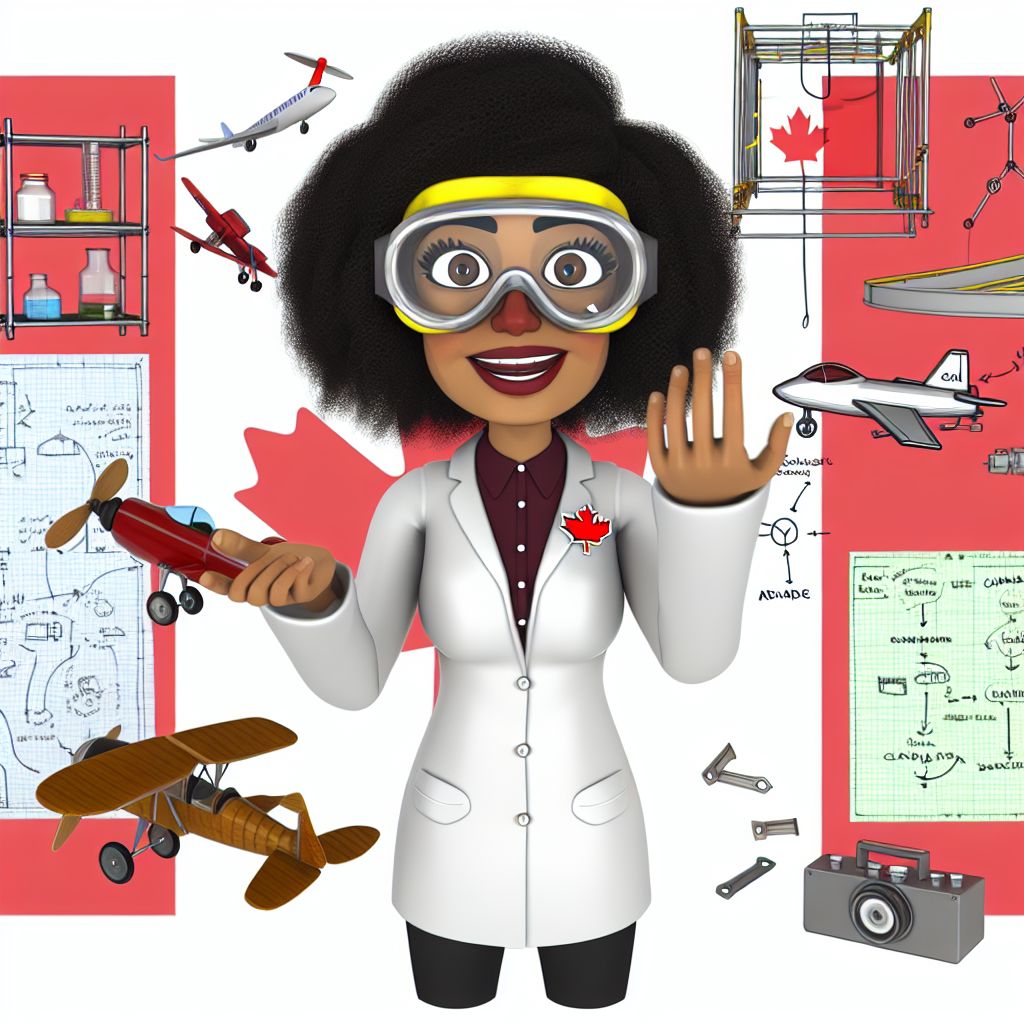High Demand for Aerospace Engineers in the Job Market
Growing Industry Needs
The aerospace industry continues to expand rapidly.
New technologies drive the demand for skilled professionals.
Private sector companies are investing heavily in aerospace solutions.
For example, SpaceX and Blue Origin are leading innovations.
Additionally, government agencies require specialized engineers as well.
Variety of Career Opportunities
Aerospace engineering offers diverse career paths.
Professionals can work on commercial aviation projects.
They may also develop military defense systems.
Moreover, space exploration provides exciting prospects.
Each sector presents unique challenges and opportunities.
Competitive Salaries
Aerospace engineers enjoy attractive salary packages.
Industry demand pushes salaries above average for engineers.
Entry-level positions offer competitive pay from the start.
Experienced engineers can command significantly higher wages.
Financial rewards contribute to job satisfaction.
Role of Aerospace Engineers in Societal Advancement
Aerospace engineers play a crucial role in societal advancement.
They contribute to safer and more efficient air travel.
Advancements support global connectivity and commerce.
Furthermore, engineers are pivotal in addressing climate challenges.
Innovations in aerospace can lead to greener technologies.
Competitive Salary and Benefits of Aerospace Engineering Careers
Attractive Salary Potential
Aerospace engineers enjoy competitive salaries in their field.
According to the Bureau of Labor Statistics, the average aerospace engineer earns over $118,000 annually.
Entry-level positions offer attractive starting salaries as well.
As professionals gain experience, their earning potential rises significantly.
Many aerospace engineers work for leading companies like Boeing and Lockheed Martin.
Unlock Your Career Potential
Visualize a clear path to success with our tailored Career Consulting service. Personalized insights in just 1-3 days.
Get StartedSuch employers often provide additional financial incentives to attract talent.
Robust Employment Benefits
In addition to salaries, aerospace engineers receive excellent employment benefits.
Health insurance plans are typically comprehensive, covering various medical needs.
Many companies also offer retirement savings plans like 401(k) options.
Paid time off and holidays are commonly included in employment packages.
Professional development opportunities often enhance an engineer’s career prospects.
Companies frequently sponsor certifications and advanced degrees for their employees.
Job Security and Growth Potential
Aerospace engineering ranks among the most stable career fields.
The demand for skilled professionals continues to grow with technological advancements.
Emerging markets in space exploration and unmanned aerial vehicles promise new opportunities.
Aerospace engineers can explore various roles, from research to design to project management.
The versatility of this field allows for career mobility and constant learning.
Opportunities for Innovation and Project Development in Aerospace
A Thriving Industry
The aerospace industry offers unparalleled opportunities for innovation.
Engineers can work on cutting-edge technologies daily.
Companies like SpaceX and Boeing lead the way in advancements.
They push boundaries in space exploration and aircraft design.
Research and Development Potential
Aerospace engineers engage in extensive research and development.
They explore new materials and technologies to improve performance.
Innovations in aerodynamics lead to more efficient designs.
Additionally, engineers focus on safety and environmental impact.
Collaboration with Visionaries
Collaboration is a key aspect of aerospace engineering.
Professionals work alongside scientists and researchers worldwide.
Team projects often lead to groundbreaking discoveries.
Working with talented individuals fosters creativity and innovation.
Project Development Opportunities
Engineers manage various projects, from initial concept to completion.
They apply project management skills to ensure success.
Boeing’s 787 Dreamliner project exemplifies successful collaboration.
This project showcased integrated teams, innovative design, and global suppliers.
Contributions to National Defense
Aerospace engineers play a crucial role in national defense.
Their work on military aircraft is vital for security.
Innovations in unmanned aerial vehicles shape modern warfare.
These projects require ingenuity and technical expertise.
Emerging Trends and Opportunities in Aerospace
The aerospace sector is evolving rapidly.
Future engineers will explore electric and hybrid propulsion systems.
These advancements promise reduced emissions and greater efficiency.
Additionally, the increasing commercial space travel industry offers new avenues.
Career Growth and Advancement in Aerospace Engineering
The opportunities for career advancement are vast in aerospace engineering.
Engineers can progress to leadership positions or specialized roles.
Continuous learning and adaptation are essential in this field.
Professional development can lead to participation in groundbreaking missions.
Gain More Insights: Path to Becoming a Successful Petroleum Engineer
Contribution to Advancements in Space Exploration and Technology
Driving Innovation in Space Systems
Aerospace engineers play a pivotal role in developing advanced space systems.
They design spacecraft and launch vehicles that push technological boundaries.
Furthermore, they innovate systems that ensure safe travel beyond Earth.
These engineers utilize cutting-edge materials for enhanced performance.
As a result, they contribute significantly to mission effectiveness and safety.
Enhancing Propulsion Technologies
Propulsion remains a cornerstone of aerospace engineering.
Engineers focus on improving efficiency and reducing emissions.
Their work leads to faster and more sustainable travel options in space.
Innovative propulsion systems enable deeper space exploration.
Moreover, they attract investment and interest in space missions.
Developing Advanced Simulation Tools
Simulation tools are essential for testing aerospace technologies.
Engineers create realistic models that mimic space conditions.
These models help in predicting the behavior of systems in flight.
Additionally, simulations allow for cost-effective testing.
Ultimately, they reduce the risks involved in actual missions.
Collaboration on International Space Projects
Aerospace engineers often collaborate on global projects.
Working with international agencies enhances knowledge sharing.
This collaborative spirit leads to groundbreaking advancements.
Moreover, it fosters unity in pursuit of space exploration goals.
Engineers from various cultures contribute diverse perspectives.
Contributing to Scientific Research
Aerospace engineers support scientific research in numerous ways.
Their designs facilitate experiments in microgravity environments.
Additionally, they help gather data on cosmic phenomena.
Such contributions expand our understanding of the universe.
They also address critical challenges facing humanity.
Find Out More: Canadian Universities Offering Metallurgical Engineering
Diverse Career Paths Within Aerospace Engineering
Manufacturing and Design
Aerospace engineers play a crucial role in manufacturing aircraft and spacecraft.
They design components and systems for optimal performance and safety.
Furthermore, they often collaborate with industrial designers and technologists.
This collaboration enhances innovation and efficiency in production processes.
Research and Development
Research positions focus on advancing aerospace technologies.
Engineers in this area develop next-generation propulsion systems.
They also work on improving aerodynamics for both aircraft and spacecraft.
This sector offers the chance to address complex engineering challenges.
Systems Engineering
Systems engineers ensure all components integrate effectively.
They manage projects, overseeing schedules and budgets.
This role requires strong communication skills to liaise among teams.
Additionally, they assess risks to maintain project feasibility.
Quality Assurance
Quality assurance engineers uphold safety standards in aerospace projects.
They develop testing methodologies to ensure reliability of systems.
Moreover, they conduct audits and inspections regularly.
This process protects both consumers and personnel in the aerospace industry.
Flight Testing
Flight testers evaluate aircraft performance under various conditions.
They gather data to inform future design modifications.
Strikingly, flight testing also assesses safety procedures before flights enter service.
This job requires a thorough understanding of both engineering and piloting.
Regulatory and Compliance Roles
Regulatory specialists ensure that aerospace projects meet legal standards.
They work closely with government agencies for certifications.
These professionals also stay updated on industry regulations.
Consequently, they help to ensure public safety through compliance.
You Might Also Like: Understanding Aerospace Engineering Job Roles

Collaboration with Other Experts and Fields of Engineering
Interdisciplinary Projects
Aerospace engineers often collaborate on interdisciplinary projects.
This collaboration enhances innovation and efficiency.
Teams may include mechanical, electrical, and software engineers.
Working together leads to comprehensive design solutions.
Cross-Industry Partnerships
Aerospace engineers frequently partner with various industries.
These partnerships expand their expertise and resources.
Companies in defense, transportation, and telecommunications join forces.
This exchange of knowledge addresses complex challenges effectively.
Advanced Research Initiatives
Many aerospace engineers engage in advanced research initiatives.
Collaborative research often yields significant breakthroughs.
These initiatives may focus on sustainability or new technologies.
Working with scientists and researchers accelerates development.
Benefits of Collaboration
Collaboration broadens knowledge and skillsets across teams.
Sharing diverse perspectives leads to innovative solutions.
Moreover, it fosters strong professional networks.
Such networks provide ongoing support throughout careers.
Impact of Collaborative Efforts in Aerospace Engineering
The collaborative nature of aerospace engineering has real-world applications.
For example, the development of drones involves multiple engineering disciplines.
This technology showcases the power of teamwork and innovation.
Additionally, advancements in space exploration rely heavily on collaborations.
You Might Also Like: Salary Insights for Mechatronics Engineers in Canada
Enhanced Problem-Solving and Analytical Skills Development
Importance of Problem-Solving Skills
Problem-solving skills are vital for aerospace engineers.
The aerospace industry faces complex challenges regularly.
Engineers must analyze issues critically and derive solutions.
Often, problems arise under tight deadlines and high stakes.
This environment fosters quick thinking and adaptability.
Analytical Skills in Engineering
Analytical skills enable engineers to interpret data accurately.
Engineers rely on these skills to assess aircraft performance.
They also evaluate engineering designs for safety and efficiency.
Data analysis involves intricate calculations and simulations.
Strong analytical skills enhance decision-making processes.
Developing Enhanced Skills Through Education
Aerospace engineering programs emphasize problem-solving techniques.
Students engage in hands-on projects and real-world simulations.
Lectures focus on theory while labs provide practical application.
This combination fosters deeper understanding and skill mastery.
Group projects encourage collaboration and collective problem-solving.
Real-World Applications of Skills
Aerospace engineers apply these skills to various projects.
From designing new aircraft to improving existing technologies,
they face challenges that require innovative thinking.
Real-world applications create opportunities for creativity.
Engineers often present solutions to industry leaders.
Career Advancement Enabled by Enhanced Problem-Solving Skills
Improved problem-solving skills open career advancement opportunities.
Employers highly value analytical thinkers in the industry.
As engineers develop these skills, they contribute significantly.
Ultimately, this enhances both personal and organizational success.
Investing in these skills creates a lasting impact in aerospace engineering.
Global Opportunities for Aerospace Engineers in an Interconnected World
Expanding Career Horizons
The demand for aerospace engineers is skyrocketing worldwide.
Many countries seek skilled professionals for innovation in aviation and space.
For example, firms in Europe invest heavily in new aeronautics technologies.
Additionally, Asian countries are rapidly expanding their aerospace industries.
Diverse Work Environments
Aerospace engineers can work in various sectors.
They often find roles in defense, commercial aviation, and space exploration.
This diversity enriches their career experiences.
Furthermore, opportunities in research and development offer stimulating challenges.
Collaboration Across Borders
The aerospace industry thrives on international partnerships.
Engineers frequently collaborate with global teams to share expertise.
This cooperation fosters innovation and drives advancements.
Additionally, multinational projects enhance cultural understanding.
Growing Focus on Sustainability
Sustainability is becoming a priority in aerospace engineering.
Many companies focus on reducing the environmental impact of aviation.
This shift opens new opportunities for engineers specializing in green technologies.
Consequently, aerospace engineers can lead the charge toward sustainable aviation.
Technological Advancements and Innovations
Rapid technological advancements create exciting new roles.
Engineers can specialize in drones, electric flight, and autonomous systems.
These innovations continually reshape the aerospace field.
Moreover, engineers play a vital role in pioneering future technologies.
Career Advancement Potential
The aerospace sector offers excellent career growth opportunities.
Skilled engineers often advance into managerial and leadership positions.
They can also transition to academia, sharing knowledge with future engineers.
This versatility makes aerospace engineering a dynamic and sought-after profession.




